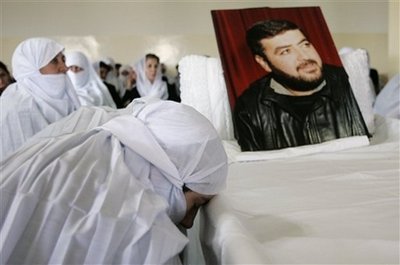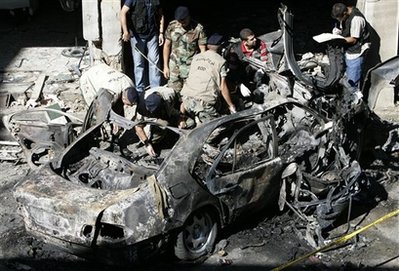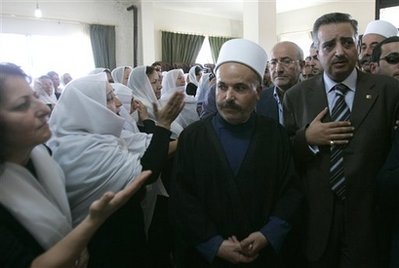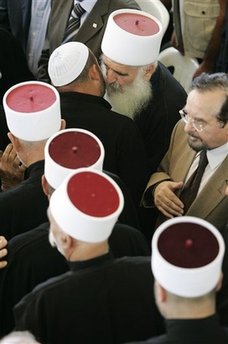 By Agence France Presse (AFP), BEIRUT: Lebanese and international leaders urged calm on Thursday as they condemned a political assassination that threatened to undermine efforts to reconcile rival factions in Lebanon. Saleh Aridi, a senior member of the Lebanese Democratic Party, was assassinated in a car bombing late on Wednesday in his hometown of Baysour, southeast of Beirut. A security official said the bomb, made of 700 grams of explosives, was placed under his car. There was no immediate claim of responsibility. United Nations Secretary General Ban Ki-moon on Thursday condemned the car bombing and urged rival parties to show "restraint." "This violence only underscores how important it is for dialogue and reconciliation to move forward," the UN chief told a news conference. Six people were also slightly wounded in the attack, which was also condemned by both Washington and
By Agence France Presse (AFP), BEIRUT: Lebanese and international leaders urged calm on Thursday as they condemned a political assassination that threatened to undermine efforts to reconcile rival factions in Lebanon. Saleh Aridi, a senior member of the Lebanese Democratic Party, was assassinated in a car bombing late on Wednesday in his hometown of Baysour, southeast of Beirut. A security official said the bomb, made of 700 grams of explosives, was placed under his car. There was no immediate claim of responsibility. United Nations Secretary General Ban Ki-moon on Thursday condemned the car bombing and urged rival parties to show "restraint." "This violence only underscores how important it is for dialogue and reconciliation to move forward," the UN chief told a news conference. Six people were also slightly wounded in the attack, which was also condemned by both Washington and  Damascus. "The United States is deeply concerned about the latest violence in Lebanon," State Department spokesman Sean McCormack said in a statement. "Our support for the Lebanese government and its democratic institutions is unwavering," he added. The Syrian Foreign Ministry said that Damascus "firmly denounces the criminal and terrorist act," adding that Syria was "convinced that such crimes that target security and stability in Lebanon will not achieve their objectives." The European Union also condemned the crime and called for an investigation into the killing. Speaking on behalf of the EU, a French Foreign Ministry spokesman said that the EU supported Lebanon’s efforts "to stop terrorism."
Damascus. "The United States is deeply concerned about the latest violence in Lebanon," State Department spokesman Sean McCormack said in a statement. "Our support for the Lebanese government and its democratic institutions is unwavering," he added. The Syrian Foreign Ministry said that Damascus "firmly denounces the criminal and terrorist act," adding that Syria was "convinced that such crimes that target security and stability in Lebanon will not achieve their objectives." The European Union also condemned the crime and called for an investigation into the killing. Speaking on behalf of the EU, a French Foreign Ministry spokesman said that the EU supported Lebanon’s efforts "to stop terrorism."
 Lebanese President Michel Sleiman warned against any attempt to derail efforts under way to achieve national reconciliation, with the attack taking place just a day after he announced the start of a multi-party dialogue next Tuesday. "We must beware of conspiracies aimed … at scuttling efforts toward reconciliation and preparations for national dialogue," the president said in a statement. Aridi, in his 50s, was a top adviser to pro-Syrian Druze leader and Youth and Sports Minister Talal Arslan, a rival to Druze anti-Syrian leader Walid Jumblatt. Aridi’s father is also a leading Druze religious figure. Jumblatt denounced the attack as a bid to sow violence between his party and Arslan’s, after the two had reconciled in May following fierce clashes between rival clans. The slain adviser had played a key role in the
Lebanese President Michel Sleiman warned against any attempt to derail efforts under way to achieve national reconciliation, with the attack taking place just a day after he announced the start of a multi-party dialogue next Tuesday. "We must beware of conspiracies aimed … at scuttling efforts toward reconciliation and preparations for national dialogue," the president said in a statement. Aridi, in his 50s, was a top adviser to pro-Syrian Druze leader and Youth and Sports Minister Talal Arslan, a rival to Druze anti-Syrian leader Walid Jumblatt. Aridi’s father is also a leading Druze religious figure. Jumblatt denounced the attack as a bid to sow violence between his party and Arslan’s, after the two had reconciled in May following fierce clashes between rival clans. The slain adviser had played a key role in the  reconciliation effort. Aridi, who was married and had five children, is scheduled to be buried in his hometown at 1 p.m. on Friday. "Message received," said Arslan, who rushed back to Lebanon from abroad on hearing of the killing. He refused to speculate as to who was behind the attack. Arslan, who offered his condolences to Sheikh Farhan Aridi, Saleh’s father, told reporters in Baysour that the mountains would stay united despite attempts to sow discord. "What you and I have started together on May 7 shall continue for the sake of the mountains and the nation," Arslan said in reference to Aridi’s efforts to reconcile Druze factions. The Democratic Party leader also stressed that "while political differences are legitimate, unrest and divide are forbidden." He added that the crime would be referred to the Judicial Council, the country’s highest judicial authority.
reconciliation effort. Aridi, who was married and had five children, is scheduled to be buried in his hometown at 1 p.m. on Friday. "Message received," said Arslan, who rushed back to Lebanon from abroad on hearing of the killing. He refused to speculate as to who was behind the attack. Arslan, who offered his condolences to Sheikh Farhan Aridi, Saleh’s father, told reporters in Baysour that the mountains would stay united despite attempts to sow discord. "What you and I have started together on May 7 shall continue for the sake of the mountains and the nation," Arslan said in reference to Aridi’s efforts to reconcile Druze factions. The Democratic Party leader also stressed that "while political differences are legitimate, unrest and divide are forbidden." He added that the crime would be referred to the Judicial Council, the country’s highest judicial authority.
The assassination of Aridi, a pro-Syrian political figure whose party is allied with Hizbullah, was the latest in a string of car bomb attacks that began in Lebanon in October 2004, targeting mainly anti-Syrian politicians.
Commenting on the crime, Prime Minister Fouad Siniora said that the assassination targeted the general atmosphere of reconciliation in the country.
Siniora added that Aridi had been playing a significant conciliatory role between Arslan and Jumblatt.
"Whoever is behind the crime wanted to get rid of a person who was trying to bridge the gap between Arslan and Jumblatt," he added.
Meanwhile, Future Movement leader Saad Hariri, who is steering reconciliation efforts between Sunnis and Shiites in the Bekaa after signing a reconciliation agreement between Sunnis and Alawites Tripoli, contacted Arslan on Thursday, offering his condolences and condemning the crime, which he described as a "conspiracy against all of us."
Also commenting on the crime, Hizbullah pointed the finger at Israel, saying Aridi’s killing was aimed at destabilizing Lebanon.
"This serves the interests of Israel which is affected by … reconciliation efforts and wants to prevent stability in the country," the party said in a statement, urging authorities to treat the crime with "maximum priority."
An outspoken pro-Syrian Druze politician, former Cabinet minister Wi’am Wahhab, also accused Israel of the killing, saying the attack "clearly carries Israeli fingerprints." He did not elaborate.
Iran on Thursday also blamed the "Zionist entity" for the attack and called for safeguarding Lebanon’s national unity.
Foreign Ministry spokesman Hassan Kashkavi said the crime also targets "the Lebanese people’s unity and accomplishments of the victorious resistance."
Also on Thursday, former President Amin Gemayel condemned the crime, describing Aridi as "an advocate of inter-Druze dialogue."
"This crime targets the recent reconciliation in the mountains as well as the upcoming national dialogue," he said. – AFP, with The Daily Star



